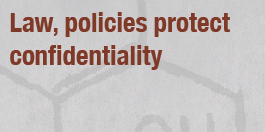
Law, policies protect confidentiality
Emergency services available to students
Medical director for the Minnesota Poison Control Center Jon Cole said
in 2015 the Minnesota State Legislature passed a law allowing any person to be free of legal jeopardy if they call 911 during an overdose emergency.
“If you bought drugs illegally and you and your friend use them and your friend overdoses and you freak out and you call 911, by law in Minnesota they can no longer prosecute you for possessing illegal drugs for personal use,” Cole said.
According to Cole, the Minnesota Poison Control Center is available to take calls regarding ingestion of harmful substances.
“Anybody can call us, 24/7/365, (if) it’s Christmas Day and you want to call us you can,” Cole said. “It’s free and confidential 100 percent, even if you just have questions about drug use or opioids.”
Hanson said her job is bound by federal and state confidentiality guidelines.
“State statute says students under the age of majority, which is 18, can give consent for chemical and sexual health information and treatment without needing parent permission,” Hanson said.
Hanson also said the information shared with her is confidential unless it appears life-threatening.
“If we’re talking about heroin use or something like that, I am going to break your confidentiality. I’d rather have you pissed off at me and alive than dead and no opportunity to try (recovery) again,” Hanson said.
Gardner said the Hazelden Betty Ford Foundation is a national system of addiction treatment care with five sites in Minnesota.
“Our mission (is) beyond just to treat addiction, but it’s to educate the public about the problem of addiction and also the possibility of recovery,” Gardener said. “We do things along the entire continuum — not just treatment but also prevention.”
Brooks said students need to be more educated about the risks of using opioids.
“We probably should take the time to express to the youth at this school how it affects the body and the soul because it’s really important,” Brooks said. “I feel like maybe an awareness day, have a guest speaker come in who’s been struggling with opioid addiction who overcame it (and) maybe watch videos.”
Hanson said she aims to support students who are struggling and guide them toward helpful resources.
“What a student reveals to me is not able to be used against them in a punitive sense here at school,” Hanson said. “My whole piece is to circumvent any kind of suspensions or things like that, so if we can get on board kind of an assessment being done or some therapy help outside of school or any of those pieces that is the ultimate goal.”
Gardner said the Hazelden Betty Ford Foundation focuses on discussing addiction and informing people about the various aspects of it.
“We’re really trying to impact, in a positive way, how addiction is addressed in different levels of society and at different stages of the disease process,” Gardner said.
According to Hodges, talking about the opioid crisis is the best way to begin raising awareness.
“I think just starting a conversation is the most important thing to start out (with) because a lot of people just aren’t aware of the effects that it’s having on people,” Hodges said.